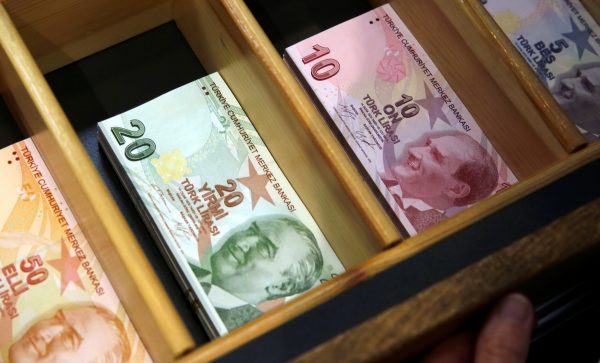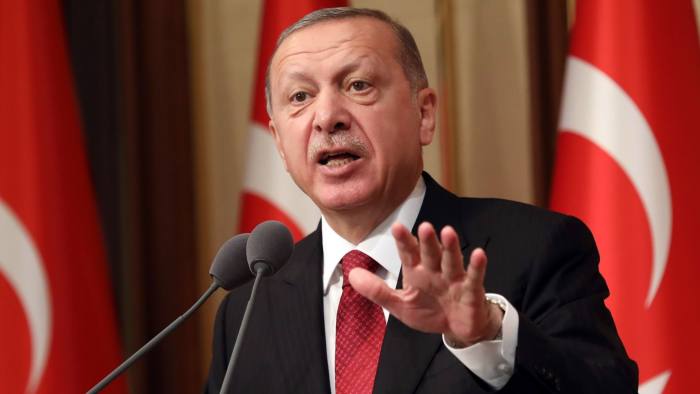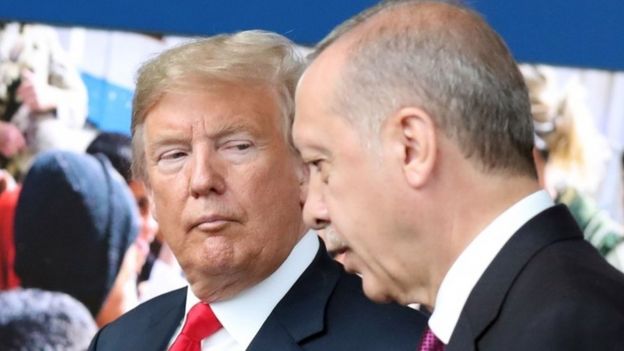- Joined
- Dec 6, 2010
- Messages
- 33,424
- Reaction score
- 5,684
Trump doubling tariffs in retaliation for jailed American pastor send Turkey's economy plunging
By Hollie McKay | August 13, 2018
By Hollie McKay | August 13, 2018
Fierce tensions between the United States and Turkey have continued to escalate over the weekend – resounding through the global economy and inseminating volatility throughout the Middle East markets – in response to Trump’s tough crackdown on the once esteemed NATO ally.
“I have just authorized a doubling of Tariffs on Steel and Aluminum with respect to Turkey as their currency, the Turkish Lira, slides rapidly downward against our very strong Dollar! Aluminum will now be 20% and Steel 50%,” Trump tweeted Friday. “Our relations with Turkey are not good at this time!”
The Turkish lira, tumbled from 4.7 to the dollar to a depleted 6.4 to the dollar, for the first time in history breaking the 6 mark. The lira is reported to have more than 30 percent of its value throughout August, with the biggest hit – a fall of 14 percent – happening Friday. The yield on Turkish decade-long bonds has risen to over 20 percent and inflation is now running at over 15 percent compared to 11 percent one year ago, according to TradingEconomics.
At the crux of the diplomatic dispute is Turkey’s refusal to release American Pastor Andrew Brunson, who has been detained in Turkey for 21 months on “terrorism” charges – suspected of having ties to the outlawed Gulenist movement – along with alleged espionage accusations. U.S. State Department representatives have called the file against him as entirely uncreditable.
Brunson, who had been living in Turkey for more than 20 years doing missionary work and ran a small church in the coastal city of Izmir, is largely thought to be a mere political prisoner and bargaining tool for the Turkish government.
The Trump administration had earlier slapped sanctions on two top Turkish government officials for their fundamental role in Brunson’s ongoing detainment, and Congress is pushing for even more sanctions, such as blocking a delivery of F-35 fighter jets to Turkey and halting funding from the World Bank and the International Monetary Fund to the beleaguered country that once boasted a robust economy, unique to the Middle East.
For a time, it seemed the Trump team had a deal in the works to avoid such tensions coming to a head, with various concessions and incentives being given to Ankara, including the dropping of charges on Turkish guards accused of beating anti-Erdogan protesters in Washington. Yet such deal talks are said to have fallen apart in the past month following the NATO summit in Brussels.
Nonetheless, Erdogan has showed no sign of conceding to Trump’s iron-fist even as his entire economy is on the brink of crashing. In a speech Friday he insisted his country “will not lose the economic war,” and called on Turks to sell their gold and dollars and buy lira to boost the flagging currency – of which analysts have since called “laughable.”
While strains between the two military allies appear to have hit a high point, tensions have been brewing for some years in the rocky relationship.

U.S. officials based in Ankara told Fox News in April that diplomatic relations were at their lowest point, fueled in large part by the detainment of Brunson and several other dual U.S citizens – including U.S. Embassy employees – but also as a result of Turkey entering into a deal last September with NATO nemesis Russia to purchase their S-400 surface-to-air-missile system which would thus require Russian military technicians operating in the arena.
Ankara also announced that Erdogan had personally held a call with Russian President Vladimir Putin on Friday to address their economic links in the midst of the monetary turbulence.
A central point of contention of Erdogan personally is the U.S.’ refusal to extradite Pennsylvania-based cleric Fethullah Gulen, who the president blames for orchestrating the failed 2016 coup attempt to overthrow his government. U.S. officials told Fox News that the two countries do have an extradition treaty and that the matter has been looked into by the Department of Justice, yet the Turks have not been able to provide irrefutable evidence that Gulen was indeed behind the botched operation.
Following the rise of ISIS in the region around 2014, hostilities also seethed as some Americans accused Turkey of allowing a porous border to provide safe haven to the Islamic insurgency and fertile ground to finance their terrorism. Meanwhile, the Turks assailed the U.S. for arming Syria’s main Kurdish militia, initially the YPJ was folded into what was called the Syrian Democratic Forces (SDF), which they consider to be under the same umbrella as the Turkey-based outlawed Kurdish separatist group, the PKK.
Last edited:







